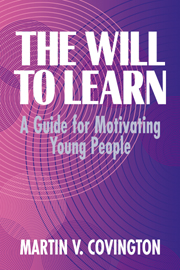Book contents
- Frontmatter
- Contents
- 1 The Future and Its Discontents
- 2 Motives as Emotions
- 3 Motives as Thoughts
- 4 Self-Worth and the Fear of Failure
- 5 The Competitive Learning Game
- 6 Motivational Equity and the Will to Learn
- 7 Strategic Thinking and the Will to Learn
- 8 An Immodest Proposal
- 9 Obstacles to Change: The Myths of Competition
- Epilogue
- Appendixes
- References
- Author Index
- Subject Index
3 - Motives as Thoughts
Published online by Cambridge University Press: 31 January 2011
- Frontmatter
- Contents
- 1 The Future and Its Discontents
- 2 Motives as Emotions
- 3 Motives as Thoughts
- 4 Self-Worth and the Fear of Failure
- 5 The Competitive Learning Game
- 6 Motivational Equity and the Will to Learn
- 7 Strategic Thinking and the Will to Learn
- 8 An Immodest Proposal
- 9 Obstacles to Change: The Myths of Competition
- Epilogue
- Appendixes
- References
- Author Index
- Subject Index
Summary
I would say only that if some of my judgments were wrong … they were made in what I believed at the time to be in the best interest of the nation.
Richard Nixon, August 1974According to Fritz Heider (1958), each of us, including ex-presidents, searches ceaselessly for ways to create meaning in our lives. Heider proposed that this process is guided by the principles of attribution theory, which means ascribing causes to our actions and to the actions of others. Clearly this is what Richard Nixon was doing in his resignation speech as president of the United States, trying to make comprehensible his questionable actions during the Watergate scandal. These same dynamics are also illustrated by the schoolchild who frets over a failing grade. Was failure the result of incompetency, he wonders, or the fault of the teacher for not better explaining the assignment?
Attribution theory is central to the topic of achievement motivation because in the early 1970s cognitive psychologists led by Bernard Weiner proposed a radical reinterpretation of Atkinson's need achievement model (Weiner, 1972,1974; Weiner et al., 1971). As will be recalled, Atkinson proposed emotional anticipation as the basic driving force behind all achievement behavior, and defined the motive to approach success as “a capacity to experience pride in accomplishment.” Weiner transformed Atkinson's definition with an intriguing substitution: “a capacity for perceiving success as caused by internal factors, particularly effort” (Weiner et al., 1971, p. 96).
- Type
- Chapter
- Information
- The Will to LearnA Guide for Motivating Young People, pp. 56 - 76Publisher: Cambridge University PressPrint publication year: 1997



